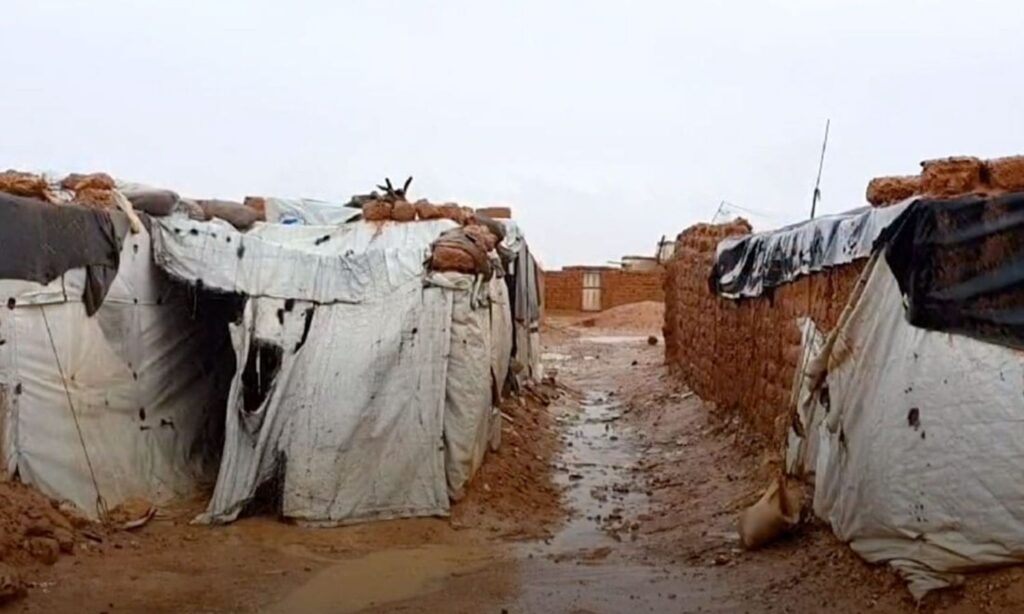Thousands of displaced people continue to reside in the al-Rukban camp located at the tri-border point between Syria, Jordan, and Iraq, despite more than a month having passed since the fall of the Syrian regime.
Residents of the camp told Enab Baladi that some of the population managed to return, while others still live in tents, due to their homes in the villages and towns they originate from being destroyed, along with financial difficulties preventing them from moving their belongings back to their areas.
Bassam Abdullah Suleiman, the head of the local council in the camp, told Enab Baladi that 3,000 people have left the camp since the fall of the Assad regime, while about 5,000 people are still waiting to secure housing for their families after their homes were destroyed by the ousted regime and the Islamic State group.
Many families residing in the camp visited their villages and original areas after the fall of the Syrian regime, but they were shocked to find their homes destroyed either by bombing or fire, which led them to hesitate before making a decision to leave the camp.
According to the head of the local council, relocating a family from the camp to outside is financially costly for the residents, and it can reach up to ten million Syrian pounds, depending on the distance between the area they wish to move to and the camp.
A new displacement journey
Mohammad al-Khalidi, a former resident of the al-Rukban camp, found his home reduced to rubble west of the city of Palmyra, in a condition unsuitable for restoration or habitation, which led him to seek new shelter in Hama province in central Syria.
Al-Khalidi preferred, along with relatives who also resided in al-Rukban, to temporarily stay in an empty building that belongs to individuals living in the Gulf region, despite the poor condition of the building that had been previously looted by the ousted regime forces.
According to al-Khalidi, there are no windows or doors in the building, and electrical cables have been stripped from the walls.
The young man expressed his fears about spending money to renovate the building or install doors and windows, as he is not assured that he will be allowed to stay in it for long.
For his part, Majid al-Qaid, who left al-Rukban a few days ago, found nothing but a relative’s home to stay in, pending his ability to secure alternative housing, especially since he does not own a private home, having lived in a state-owned house during his work at the General Phosphate Company before the outbreak of the Syrian revolution.
Al-Qaid was able to evacuate his family from the camp after securing the transport of their belongings along with other displaced persons who decided to return to their homes in the town of al-Qaryatayn, east of Homs, all at the expense of the local community in al-Qaryatayn, which donated the transportation costs.
High transportation costs
Council head Bassam Suleiman predicted an increase in the number of returnees from the camp after the winter season, citing the difficulty of travel at present. He noted that some residents are trying to secure housing, while others do not mind living in tents on the ruins of their homes, but winter weather conditions currently prevent them from doing so.
He added that the council has appealed to the Syrian Red Crescent for assistance in transporting families at its expense, but has not received a response so far, considering that the Free Syrian Army faction is responsible for providing fuel for transport vehicles, which could reduce transport costs for the camp residents wishing to return.
Mohammad al-Khalidi stated to Enab Baladi that he paid $400 to transport his family’s belongings from al-Rukban camp to Hama, an amount that every family wishing to leave must pay.
The al-Rukban camp was established in 2014 to accommodate more than 70,000 displaced residents from Deir Ezzor, Raqqa, Palmyra, and Homs, and it was a gathering point for displaced persons entering Jordan. However, after Jordan tightened restrictions on Syrian entries, it became a camp lacking the most basic living necessities, especially after Jordan closed the last medical point it oversaw in 2020.
The camp has been under a severe siege by the ousted regime forces, and the regime has tightened security measures to prevent the entry of medicines and food supplies, also barring the Syrian Red Crescent from distributing food baskets.











